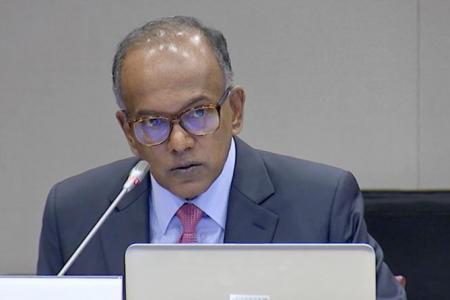Fake news a new brand of warfare, say experts
Those unable to use military means could resort to this, says Minister for Home Affairs
A campaign of disinformation, where falsehoods are spread subtly and gradually, could be the first step in an attack on Singapore.
This would apply especially to foreign actors who want to attack Singapore but cannot do so using military means, Law and Home Affairs Minister K. Shanmugam said yesterday, the first day of hearings by a Parliamentary Select Committee on deliberate online falsehoods.
He was deliberating with Dr Michael Raska of the S. Rajaratnam School of International Studies on how information warfare and cyber conflicts have been in play throughout the world and their implications for Singapore.
While Singapore might have the edge in conventional warfare, said Dr Raska, the use of disinformation campaigns aimed at political, racial and religious fracture points that may exist in society can offset an attacker's military inferiority.
"These attacks can happen far away where a conventional response is not viable," said Dr Raska, one of 10 individuals invited to elaborate on written submissions they had submitted.
A campaign of disinformation also conflicts with Singapore's concept of deterrence, which has revolved around conventional warfare, he added.
Mr Shanmugam then pointed out that the "logical conclusion" for foreign actors to weaken Singapore is to "first engage in information warfare". Agreeing, Dr Raska said the fracture points raised by such actors do not have to stem from within Singapore to create tensions.
"Singapore can be drawn into crisis outside, externally, where Singapore's reputation... any sort of issue that would threaten Singapore's international standing, could be challenged," he said.
SOCIAL MEDIA
Senior Minister of State for Communications and Information Janil Puthucheary cited Dr Raska's earlier research where he emphasised the growing importance of social media in military campaigns, by identifying existing fault lines and creating new ones.
Dr Raska said: "(Social media) can create new fault lines, amplifying tensions or issues that have not been previously thought of as important, and can be rapidly disseminated or diffused and suddenly become very, very, important."
In his written submission, Dr Raska said cyber warfare has increasingly been recognised as a fundamental strategy for warfare by countries.
He cited the example of China's People's Liberation Army, which has moved to focus on "information dominance" since 2015, with the aim of fighting and winning localised information wars.
In comparison, Singapore's security paradigm has not really changed and would need to further adapt to changes, he said.
He said the centre of gravity for future conflicts will be the perceptions of the population and the decision-making cycles of the leadership.
Information warfare might already have started on our shores, as Mr Shanmugam alluded to cyber attacks made on ministries here, such as the Foreign Affairs Ministry, at an earlier session with researchers from the Institute of Policy Studies.
The last parliamentary committee hearings were held 14 years ago - on changes to laws on building maintenance and management.
The public hearings on deliberate online falsehoods continue today.
FOR MORE, READ THE STRAITS TIMES TODAY
Get The New Paper on your phone with the free TNP app. Download from the Apple App Store or Google Play Store now



